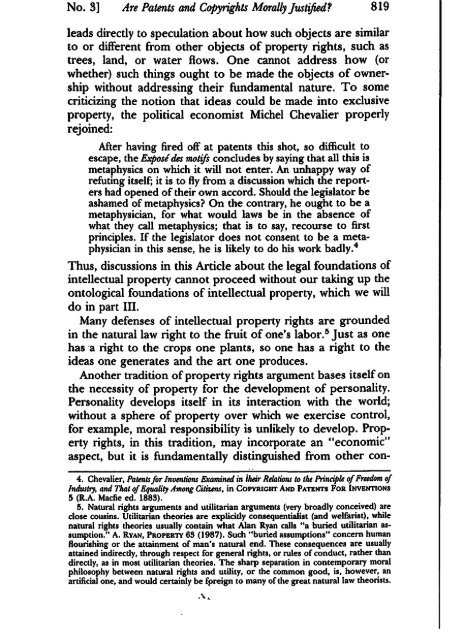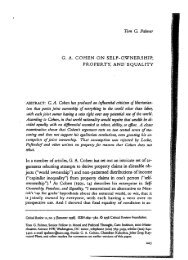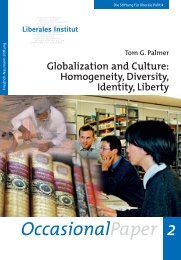Are Patents and Copyrights Morally Justified? - Tom G. Palmer
Are Patents and Copyrights Morally Justified? - Tom G. Palmer
Are Patents and Copyrights Morally Justified? - Tom G. Palmer
You also want an ePaper? Increase the reach of your titles
YUMPU automatically turns print PDFs into web optimized ePapers that Google loves.
No. 3] <strong>Are</strong> <strong>Patents</strong> <strong>and</strong> <strong>Copyrights</strong> <strong>Morally</strong> <strong>Justified</strong>? 819<br />
leads directly to speculation about how such objects are similar<br />
to or different from other objects of property rights, such as<br />
trees, l<strong>and</strong>, or water flows. One cannot address how (or<br />
whether) such things ought to be made the objects of ownership<br />
without addressing their fundamental nature. To some<br />
criticizing the notion that ideas could be made into exclusive<br />
property, the political economist Michel Chevalier properly<br />
rejoined:<br />
After having fired off’ at patents this shot, so difficult to<br />
escape, the Exposé des molift concludes by saying that all this is<br />
metaphysics on which it will not enter. An unhappy way of<br />
refuting itself; it is to fly from a discussion which the reporters<br />
had opened oftheir own accord. Should the legislator be<br />
ashamed ofmetaphysics? On the contrary, he ought to be a<br />
metaphysician, for what would laws be in the absence of<br />
what they call metaphysics; that is to say, recourse to first<br />
principles. If the legislator does not consent to be a metaphysician<br />
in this sense, he is likely to do his work badly. 4<br />
Thus, discussions in this Article about the legal foundations of<br />
intellectual property cannot proceed without our taking up the<br />
ontological foundations of intellectual property, which we will<br />
do in part III.<br />
Many defenses of intellectual property rights are grounded<br />
in the natural law right to the fruit of one’s labor. 5 Just as one<br />
has ~aright to the crops one plants, so one has a right to the<br />
ideas one generates <strong>and</strong> the art one produces.<br />
Another tradition of property rights argument bases itself on<br />
the necessity of property for the development of personality.<br />
Personality develops itself in its interaction with the world;<br />
without a sphere of property over which we exercise control,<br />
for example, moral responsibility is unlikely to develop. Property<br />
rights, in this tradition, may incorporate an “economic”<br />
aspect, but it is fundamentally distinguished from other con-<br />
4. Chevalier, <strong>Patents</strong>forInventions Examined in Iheir Relations to the Principle of Freedom of<br />
Industrj, <strong>and</strong> That ofEquality Among Citizens, in COPYRIGHT AND PATENTS FOR INVENTIONS<br />
5 (R.A. Macfie ed. 1883).<br />
5. Natural rights arguments <strong>and</strong> utilitarian arguments (very broadly conceived) are<br />
close cousins. Utilitarian theories are explicitly consequentialist (<strong>and</strong> welfarist), while<br />
natural rights theories usually contain what Alan Ryan calls “a buried utilitarian assumption.”<br />
A. RYAN, PROPERTY 63 (1987). Such “buriedassumptions” concern human<br />
flourishing or the attainment of man’s natural end. These consequences are usually<br />
attained indirectly, through respect for general rights, or rules of conduct, ratherthan<br />
directly, as in most utilitarian theories. The sharp separation in contemporary moral<br />
philosophy between natural rights <strong>and</strong> utility, or the common good, is, however, an<br />
artificial one, <strong>and</strong>would certainly be f~reignto many of the greatnatural lawtheorists.











